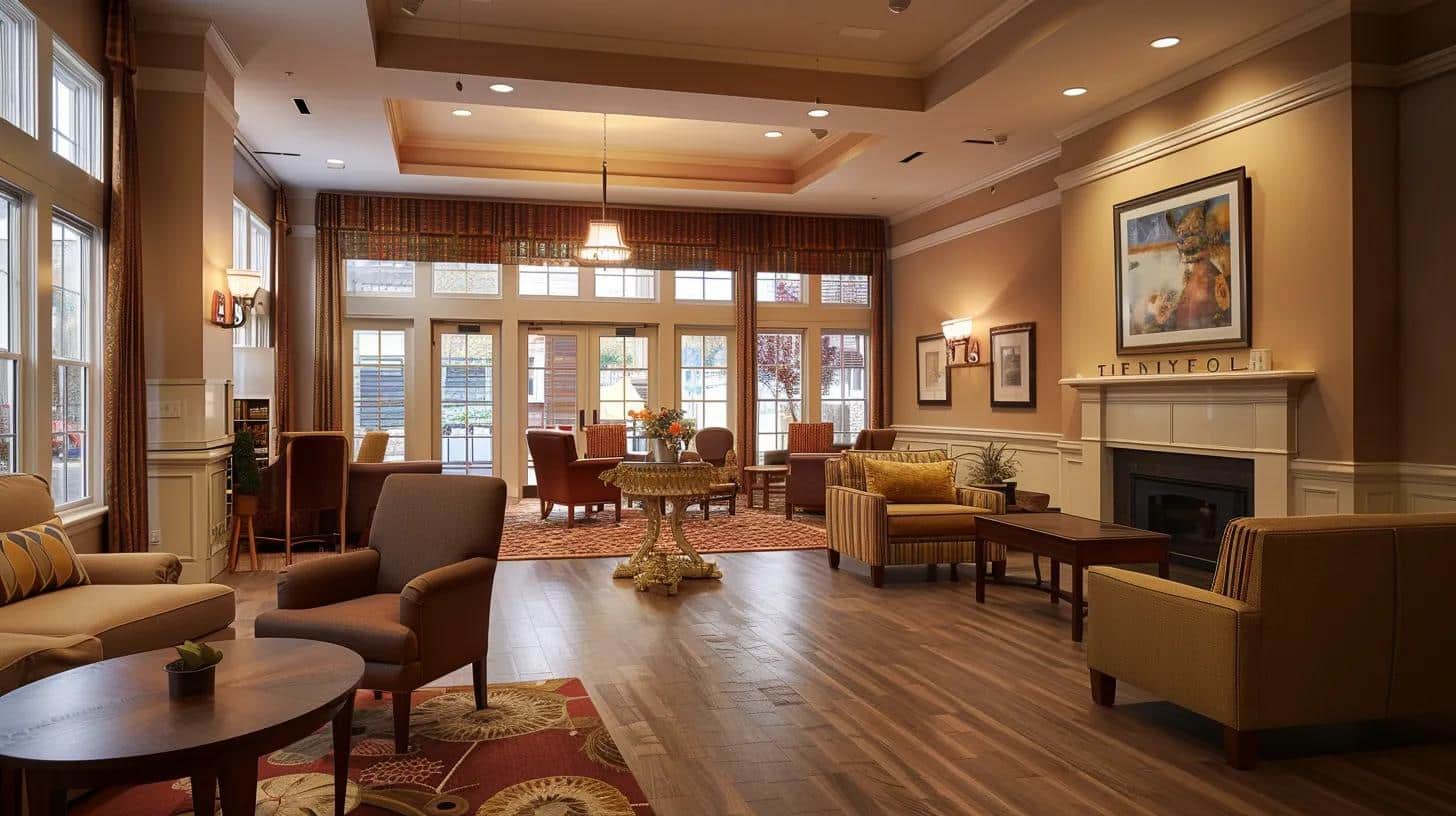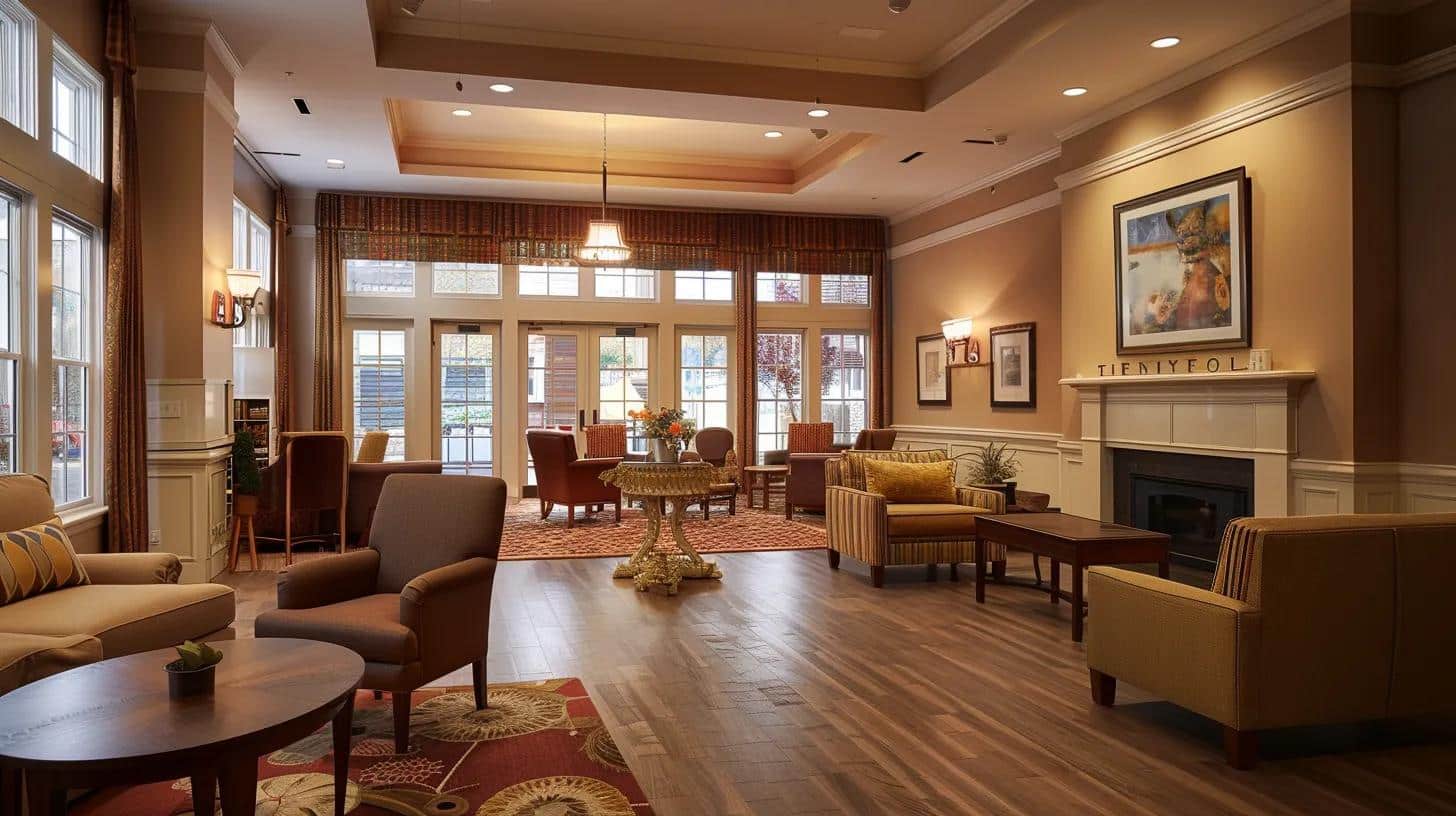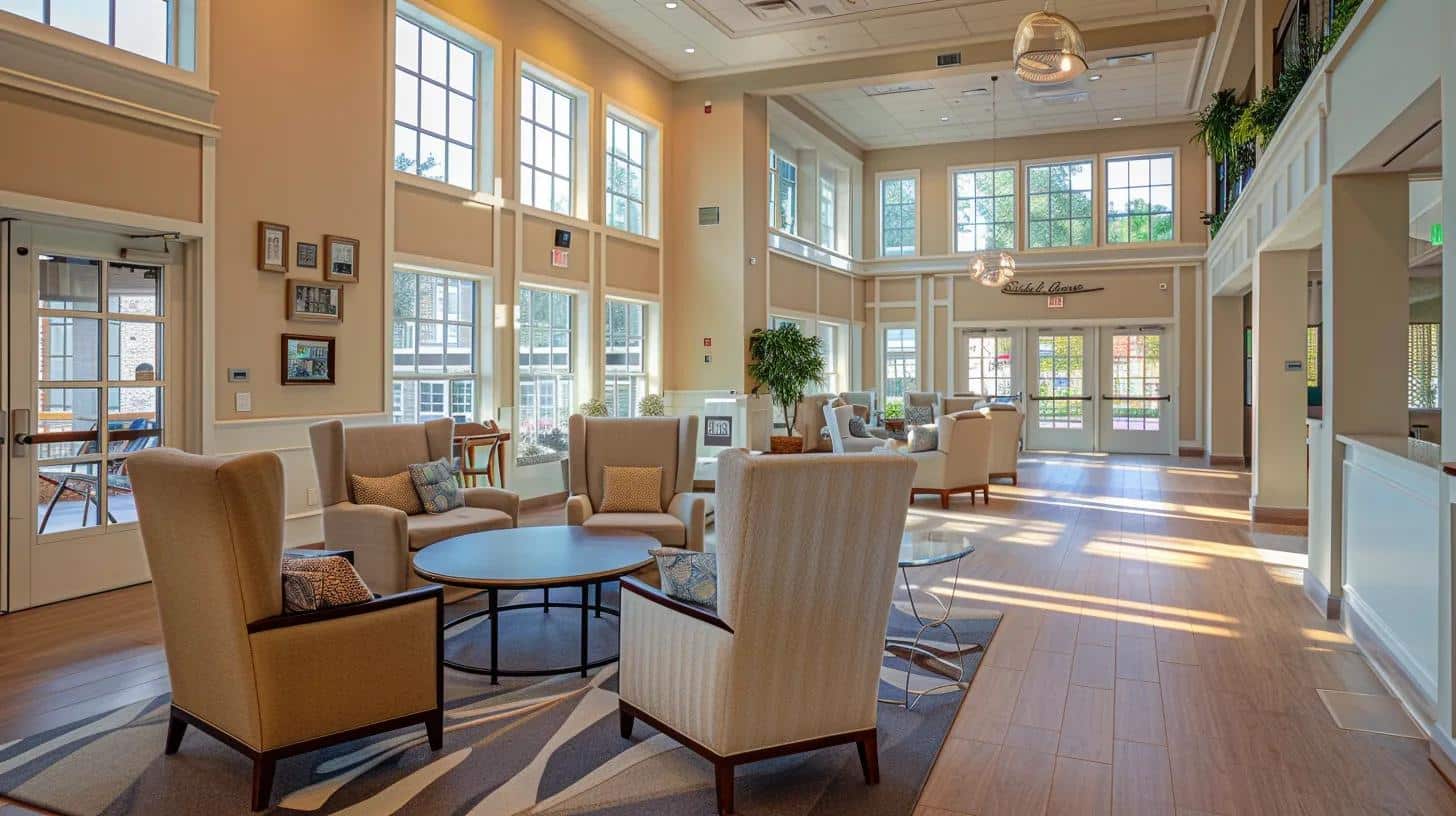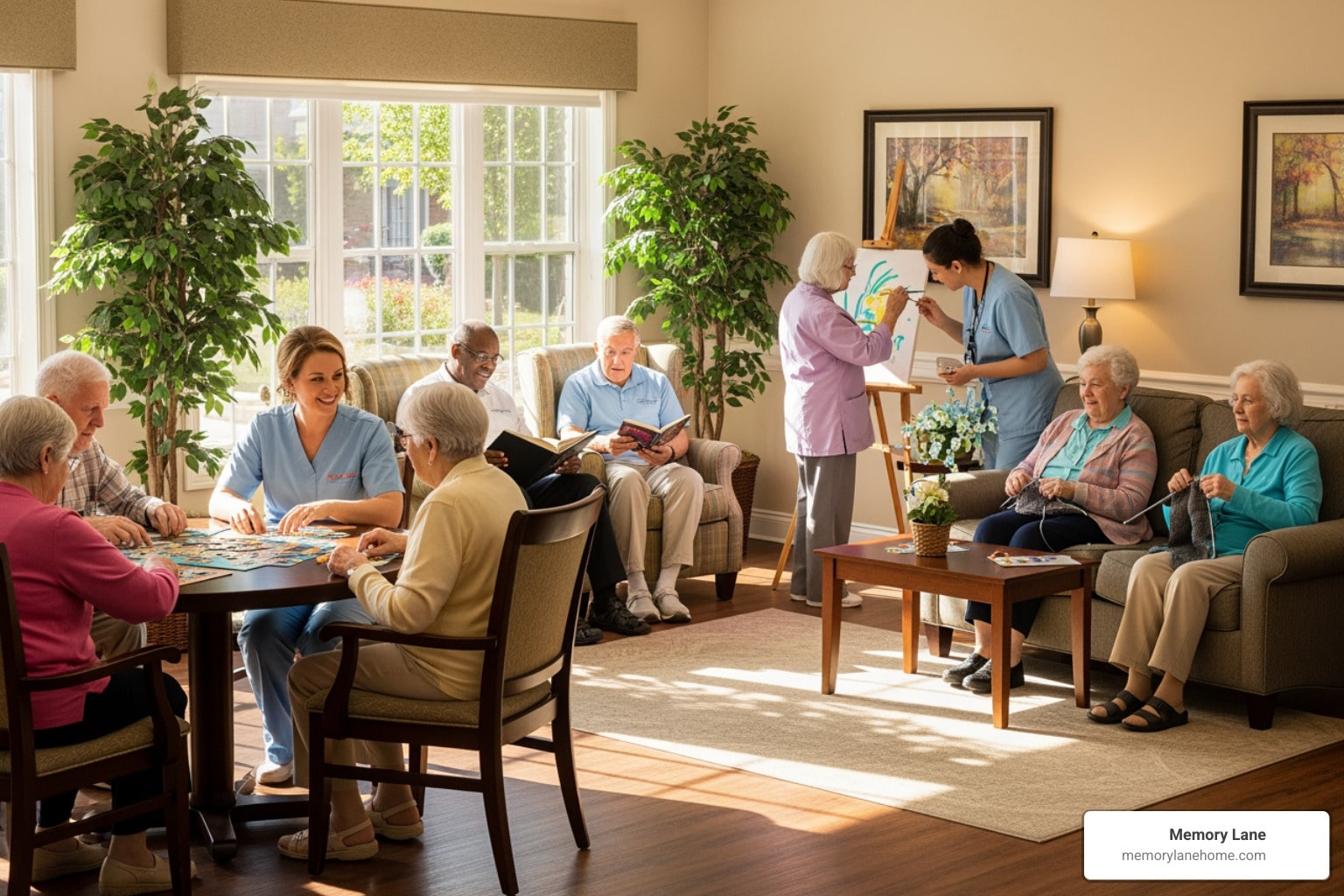Your guide to assisted living Michigan: explore costs, services, financial aid, and top communities for senior care.

Quality Assistance in Living for Dementia Management
Quality Assistance in Living for Dementia Management

approach to dementia caredementiamemory care services
Assisted Living for Dementia
Assisted living for dementia is a specialized housing option designed to meet the unique needs of individuals with memory impairments and related cognitive conditions. As dementia progresses, it becomes essential for families and healthcare providers to consider options that blend personalized care with a secure, home-like environment. This guide explains the core principles of dementia-specific assisted living, differentiates it from alternatives like nursing homes, and offers a step-by-step
, and addresses financial considerations. Ultimately, the goal is to improve quality of life for dementia patients while giving families peace of mind.
Transitioning to specialized care can be challenging, but with informed decisions based on clear guidance, families can support their loved ones’ dignity and well-being.
Table Of Contents:
- Assisted Living for Dementia
- Introduction
- Defining Assisted Living for Dementia Care
- Recognizing When Assisted Living for Dementia Is the Right Choice
- Specialized Services Offered in Assisted Living for Dementia
- Benefits of Choosing Assisted Living for Dementia Patients
- Selecting the Ideal Assisted Living Facility for Dementia Care
- The Cost of Assisted Living for Dementia and Payment Options
- The Transition Process to Assisted Living for Dementia
- Daily Life and Activities in Dementia Assisted Living
- Innovations and Approaches in Assisted Living for Dementia
- Support Systems for Families of Individuals in Assisted Living for Dementia
- Frequently Asked Questions
- Final Thoughts
Defining Assisted Living for Dementia Care
Assisted living for
is a residential setting tailored to the cognitive and physical challenges of dementia. Such facilities provide specialized services in a secure, home-like environment, emphasizing safety, individualized attention, and structured routines. Trained professionals offer personal care, assistance with daily activities, and continuous cognitive stimulation.
Core Principles of Dementia-Specific Assisted Living
Key principles include: • Individualized care protocols that respect each resident’s history and preferences. • Specialized staff training in dementia care and behavioral management. • Structured routines and environmental modifications (eg, secured perimeters, clear signage) that reduce stress and prevent wandering. • A balanced caregiver-to-resident ratio to ensure frequent, meaningful interactions. An integrated care plan—covering physical, emotional, and medical needs—ensures residents enjoy a higher quality of life.
Distinguishing Assisted Living From Nursing Home Care for Dementia
Assisted living differs from nursing home care by offering a quasi-home environment rather than a clinical setting. While nursing homes focus on intensive medical care, assisted living emphasizes independence, social interaction, and cognitive engagement. With fewer medical interventions and more opportunities for personalized activities, these facilities provide a balanced approach that supports both security and familiarity.
The Role of Memory Care Units Within Assisted Living
Many assisted living facilities include dedicated
. These units feature secured entry and exit points, sensor-equipped layouts, and navigable pathways to prevent wandering. Staff in these units are specially trained to manage behavioral crises and implement personalized care plans, including regular cognitive assessments and therapeutic activities to monitor and support residents’ cognitive function.
Typical Resident Profile in Dementia Assisted Living
Residents are typically elderly individuals at early to moderate stages of dementia. They may experience memory loss, confusion, agitation, and difficulties with daily tasks. Despite these challenges, many retain some degree of independence. Facilities focus on preserving routines and familiar environments while addressing additional health issues—such as heart disease or diabetes—through a comprehensive care approach.
Understanding Different Stages of Dementia in Assisted Living Settings
Dementia typically evolves through three stages: • Early Stage: Focus on cognitive stimulation and safety planning. • Middle Stage: Increased support with daily activities, medication management, and behavioral therapies. • Late Stage: Comprehensive support, palliative care, and closer monitoring to maintain comfort and dignity. Regular assessments allow care plans to adapt as residents progress through these stages.
Recognizing When Assisted Living for Dementia Is the Right Choice
Determining the right time for transitioning to assisted living is crucial for ensuring optimal care. Red flags include frequent confusion, agitation, difficulty with personal hygiene, and safety issues such as wandering. As the ability to manage tasks independently declines, professional support becomes increasingly necessary.
Identifying Key Signs a Loved One Needs Dementia Care Support
Warnings include: • Noticeable memory loss impacting daily activities. • Mood swings or episodes of aggression. • Difficulty in managing finances or self-care routines. Observing deterioration over time should prompt discussions with healthcare professionals regarding suitable care settings.
Assessing Safety Concerns at Home for Individuals With Dementia
Homes may lack the necessary safety features for dementia patients, leading to falls, improper medication use, and a risk of wandering. While modifications (eg, grab bars, clear pathways) help, they might not eliminate all risks. Assisted living facilities offer controlled environments with professional oversight, reducing accident risks and providing immediate assistance if needed.
The Impact of Caregiver Stress and Burnout
Continuous at-home care can lead to physical and emotional exhaustion among caregivers. The demands of dementia care may compromise both the caregiver’s health and the quality of care provided. Transitioning to an assisted living facility can relieve this burden by supplying professional support and additional caregiver resources, ultimately benefiting both the resident and their family.
How Assisted Living Addresses Progressive Dementia Symptoms
These facilities offer comprehensive programs that adjust with the resident’s changing condition. Through regular assessments and customized care plans, facilities integrate memory games, group discussions, and therapy sessions designed to slow cognitive decline. Skilled staff manage challenges like confusion and agitation, ensuring a secure environment that supports residents’ well-being.
Consulting Healthcare Professionals for Guidance
Professional evaluations help determine the appropriate level of care and assist in selecting a facility that meets the patient’s needs. Healthcare professionals can assess the stage of dementia, recommend specific services, and ensure that any transition maintains the resident’s dignity and quality of life.
Specialized Services Offered in Assisted Living for Dementia
Assisted living facilities for dementia offer targeted services to support cognitive and physical health. Their programs are designed to provide a safe, stimulating, and respectful environment that maintains as much independence as possible.
Tailored Personal Care Assistance for Dementia Residents
Personal care plans are individualized to include assistance with bathing, dressing, and eating. Staff, trained in dementia care, provide empathetic support tailored to each resident’s history and lifestyle. These plans are revisited and adjusted as the resident’s needs evolve.
Medication Management Programs in Dementia Care Facilities
Due to complex pharmaceutical regimens, careful medication management is essential. Facilities ensure that medications are administered accurately and on schedule. Nurse practitioners and other healthcare professionals closely monitor residents, adjusting dosages as needed while keeping comprehensive records to minimize side effects.
Cognitive Therapies and Engagement Activities
To slow cognitive decline, facilities incorporate memory exercises, problem-solving games, and sensory stimulation. Creative therapies, including art and music, are used to boost mood and reduce anxiety. Both group and one-on-one sessions help maintain cognitive function while enhancing social interaction.
Secure Environments to Prevent Wandering
Safety is paramount. Assisted living facilities integrate features such as secured perimeters, controlled exits, and monitoring systems (eg, sensor alarms, video surveillance) to prevent wandering. These measures create a secure yet homelike environment that minimizes risks while allowing for a comfortable living space.
Nutritional Support and Dining Experiences for Dementia Needs
Proper nutrition supports both physical and cognitive health. Tailored dining programs offer menus that address dietary restrictions and promote brain health, with meals prepared from fresh, nutrient-rich ingredients. Social dining settings encourage interaction and overall well-being, with registered dietitians monitoring nutritional intake and adjusting plans as needed.
Benefits of Choosing Assisted Living for Dementia Patients
Assisted living for dementia offers numerous benefits for residents and their families. These facilities combine specialized care, secure environments, and engaging programs to improve overall quality of life.
Enhanced Quality of Life for Residents With Dementia
Residents often experience improvements in mood, increased participation in daily activities, and stronger social connections. Personalized care and structured routines help mitigate feelings of isolation and depression, contributing to a more fulfilling day-to-day experience.
Access to Trained Dementia Care Professionals 24/7
Professional caregivers trained in dementia care are available around the clock. Their expertise ensures timely intervention in emergencies and ongoing management of both physical and behavioral health challenges, creating a stable, secure living environment.
Social Interaction and Community Engagement Opportunities
Facilities facilitate group dining, recreational activities, and social events to promote interaction. These opportunities counteract loneliness and stimulate cognitive function. Regular family visits and structured programs also help maintain a sense of community and familiarity.
Safe and Structured Living Environments
A focus on safety—from non-slip flooring and secure access points to scheduled routines—creates a predictable environment that reduces confusion and minimizes risks. Constant monitoring and a balance between structure and freedom help maintain dignity and independence.
Peace of Mind for Families and Caregivers
Professional care, transparent communication, and regular updates provide reassurance to families. Knowing that loved ones receive specialized, compassionate care alleviates caregiver stress and allows families to engage in quality interactions without the burden of round-the-clock supervision.
Selecting the Ideal Assisted Living Facility for Dementia Care
Choosing the right facility requires careful evaluation of quality, safety, staff expertise, and the overall living environment. Families should use guided questions during facility tours to ensure the chosen setting aligns with the resident’s specific needs.
Key Questions to Ask During Facility Tours
Families should inquire about: • Staff-to-resident ratios and specific dementia training. • Emergency preparedness and safety features. • Daily activity schedules and nutritional offerings. • Visitation policies and overall atmosphere. These questions help gauge whether the facility can provide the necessary support now and in the future.
Evaluating Staff Training and Experience in Dementia Care
High-quality facilities provide detailed information on staff certifications, ongoing training, and emergency handling protocols. Observing caregiver-resident interactions offers insight into the level of personalized attention and the overall quality of dementia care provided.
Assessing the Physical Layout and Safety Features
A well-designed facility minimizes confusion with clear signage, secure outdoor areas, and safe pathways. Features such as handrails and non-slip flooring are critical, ensuring residents can navigate the environment with minimal risk.
Reviewing Resident-to-Staff Ratios in Memory Care
Lower ratios allow for more attentive, individualized care—especially important for residents needing constant supervision. In-person observations during tours can reveal whether a facility maintains adequate staffing levels.
Understanding Licensing and Regulation Standards
Facilities must comply with state and federal regulations. Requesting inspection reports, certifications, and any awards can provide reassurance that the facility meets high safety and quality benchmarks.
The Cost of Assisted Living for Dementia and Payment Options
Costs vary by location, services provided, and the resident’s needs. Most facilities charge a monthly fee covering personal care, medication management, nutritional support, and social activities.
Average Expenses for Dementia Assisted Living Communities
Monthly fees generally range from $4,000 to over $8,000. Specialized dementia care often incurs higher costs due to the need for secure environments and intensive services. A detailed fee breakdown is essential to understand what is included and identify potential extra charges.
What Services Are Included in Monthly Fees
Typically, fees cover personal care assistance, housekeeping, meal preparation, and medication management, along with scheduled recreational activities. Some facilities may also offer transportation and enhanced security services.
Exploring Insurance Coverage for Dementia Care
Many facilities accept long-term care insurance, while Medicaid and Medicare may offer partial coverage depending on eligibility and state policies. Consulting with an insurance specialist can help families plan and manage costs effectively.
Understanding Medicare and Medicaid for Assisted Living
Although Medicare does not cover assisted living fully, it offers benefits for healthcare needs like medication management. Medicaid may cover long-term care services based on income and asset eligibility. Understanding these programs is crucial for financial planning.
Financial Planning for Long-Term Dementia Care
Early financial planning—including budgeting, insurance reviewing, and exploring government assistance programs—is vital. Working with a financial advisor who has expertise in elder care can create a sustainable plan that accounts for both predictable and unexpected costs.
The Transition Process to Assisted Living for Dementia
Transitioning to assisted living requires careful planning to ensure a smooth, stress-free change for both residents and families. Emotional, physical, and logistical preparations are key.
Preparing Your Loved One for the Move
Familiarization visits to the new facility, pre-move tours, and discussions about what to expect help reduce anxiety. Including the resident in planning and packing cherished personal items can preserve a sense of autonomy and comfort.
Personalizing Their New Living Space
Encouraging residents to bring familiar photos, furniture, or mementos helps create a personalized, comforting environment in their new home. Customizing the living space reinforces familiarity and aids in easing the adjustment process.
Strategies for a Smooth Adjustment Period
A smooth transition relies on clear communication and consistent routines. Scheduled visits, family days, and regular care meetings with facility staff help monitor the resident’s adjustment and address any emerging issues promptly.
Working With Facility Staff During the Transition
Active collaboration with staff is crucial. Attending care planning meetings and maintaining an open line of communication ensures that the resident’s needs are continuously met and that care remains personalized.
Emotional Support for Residents and Families
Access to counseling and support groups can help both residents and families manage the emotional impact of the transition. Such resources provide coping strategies and foster an environment of empathy and understanding during the adjustment period.
Daily Life and Activities in Dementia Assisted Living
Daily routines in assisted living are designed to encourage engagement, dignity, and a sense of normalcy. A balanced mix of physical activity, cognitive stimulation, and social interaction is central to supporting dementia patients.
Structured Routines and Their Importance for Dementia Residents
Consistent daily schedules—including regular meals, medications, and activities—provide predictability that reduces anxiety and confusion. A structured routine reinforces memory cues and helps mitigate behavioral challenges.
Therapeutic Recreation and Engagement Programs
Recreational programs, such as art, music, and light exercise, stimulate cognitive function and foster social interaction. Tailored activities are designed based on residents’ interests and abilities to promote mental and physical well-being.
Opportunities for Socialization and Companionship
Assisted living facilities provide ample opportunities for social interaction through communal dining, group events, and family visitation programs. These activities reduce isolation while stimulating cognitive processes through conversation and shared experiences.
Family Involvement and Visitation Policies
Ongoing family engagement is encouraged through flexible visitation policies and organized events that include relatives. This involvement provides emotional comfort to residents and reinforces familiar social bonds.
Ensuring Dignity and Respect in Daily Care
Staff are trained to uphold residents’ dignity by involving them in care decisions and respecting their personal preferences. Small gestures—such as using residents’ names and honoring routines—help maintain a respectful, compassionate care environment.
Innovations and Approaches in Assisted Living for Dementia
Recent innovations continue to improve the quality of dementia care by integrating new strategies and technologies.
Person-Centered Care Philosophies in Dementia Treatment
Care is tailored to each resident’s individuality, ensuring that personal history, interests, and routines guide care decisions. This approach improves adherence to care plans and fosters a sense of self-worth and continuity.
Technology Integration for Safety and Wellbeing
Innovative tools such as wearable devices, motion sensors, and GPS tracking enhance resident safety and facilitate timely interventions. Smart home technologies and digital platforms help monitor health metrics and adjust care as necessary.
Non-Pharmacological Approaches to Managing Dementia Behaviors
Therapeutic interventions—such as music therapy, art therapy, and reminiscence therapy—offer alternatives to medication for managing behavioral symptoms. These approaches work in tandem with traditional methods to improve mood and slow cognitive decline.
The Role of Sensory Stimulation in Dementia Care
Techniques including aromatherapy, tactile stimulation through therapeutic objects, and multi-sensory rooms promote relaxation and enhance communication, stimulating both memory and emotional well-being.
Ongoing Research and Future Trends in Dementia Assisted Living
Emerging trends point to the integration of personalized medicine, advanced behavioral analytics, and artificial intelligence. These advances promise to further individualize care plans and improve early detection of behavioral changes.
Support Systems for Families of Individuals in Assisted Living for Dementia
Dementia not only affects the individual but also places significant emotional and practical burdens on families. Many facilities now offer support systems aimed at helping relatives navigate these challenges.
Family Counseling and Support Groups
Group sessions and counseling provide a safe space for families to share experiences, learn stress management techniques, and gain guidance on coping strategies. Such interactions build a supportive community among caregivers.
Educational Resources on Dementia Progression
Workshops, seminars, and printed materials help families understand the progression of dementia and prepare for future care needs. Better understanding fosters proactive planning and reduces uncertainty.
Communication Channels With Care Staff
Regular meetings, online portals, and designated communication channels keep families updated on their loved one’s condition, ensuring any concerns are promptly addressed.
Navigating Grief and Emotional Challenges
Professional support helps families manage feelings of grief, sadness, and frustration. Whether through individual or group counseling, these resources offer practical advice for emotional resilience.
Advocating for Your Loved One’s Needs
Active advocacy by families—through regular care plan reviews and open dialogue with staff—ensures that the resident’s care remains a priority and adjusts with their evolving needs.
Frequently Asked Questions
Q: What are the main benefits of assisted living for individuals with dementia? A: Assisted living for dementia offers a secure, supportive environment with tailored care that enhances cognitive and physical health. Benefits include personalized care plans, 24/7 access to trained professionals, structured routines that reduce agitation, and integrated social activities that promote engagement.
Q: How can families determine when it is time to move a loved one into assisted living? A: Consider assisted living when a loved one shows increased confusion, agitation, or difficulty managing daily tasks, and when safety issues like wandering become a concern. Professional evaluations can help determine if home care is no longer sufficient.
Q: What unique services do dementia-assisted living facilities offer compared to traditional nursing homes? A: These facilities emphasize quality of life with activities that stimulate cognitive function, secure environments that prevent wandering, and personalized support with daily living. In contrast, nursing homes typically focus more on medical and clinical care.
Q: How do memory care units within assisted living facilities ensure resident safety? A: Memory care units feature secured entry/exit points, clear signage, and monitoring systems to prevent wandering. Staff trained in dementia care provide continuous supervision and personalized interventions when needed.
Q: What steps can families take to financially plan for long-term dementia care in assisted living? A: Families should assess average costs, explore insurance options (including long-term care insurance, Medicaid, and Medicare), and consult with financial advisors experienced in elder care. Detailed fee breakdowns help avoid unexpected expenses.
Q: How do technology and non-pharmacological approaches improve dementia care in assisted living settings? A: Innovative technologies (wearable devices, sensors) enhance real-time monitoring and safety, while non-pharmacological therapies such as cognitive exercises and sensory stimulation help manage behavioral symptoms and support memory.
Q: What role does family involvement play in the success of assisted living for dementia patients? A: Family involvement is crucial, as it provides ongoing emotional support, ensures that care reflects the resident’s personal history, and maintains connections through regular visits and communication with staff.

Final Thoughts
Assisted living for dementia offers a comprehensive, home-like environment with specialized services that address the unique challenges of cognitive impairment. By combining personalized care, secure settings, and therapeutic programs with ongoing family support, these facilities enhance quality of life for residents and ease the burden on caregivers. Ongoing innovations promise to further refine care practices, leading to more effective, empathetic, and tailored solutions for dementia care.


